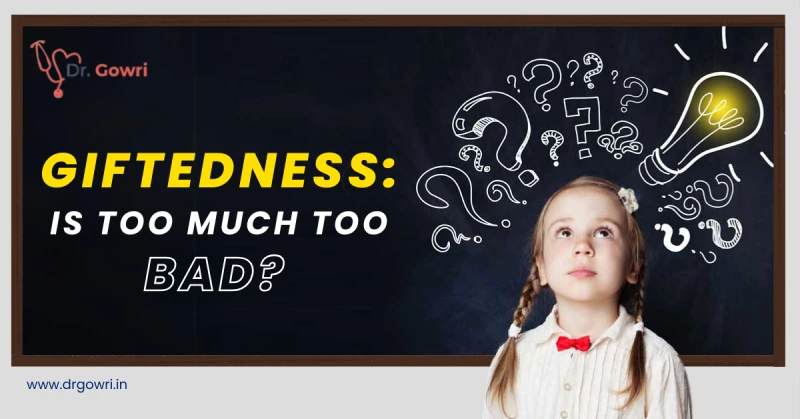– Parker J. Palmer
Gifted children are a fascinating population, with potential, creativity, and extraordinary talents that set them apart from their peers. Often identified by their high intellectual abilities, these children can exhibit a range of distinct characteristics, behaviour patterns, and learning approaches. The discovery that a child has exceptional abilities can be both thrilling and confusing for parents, guardians, and educators. Understanding gifted children isn’t just about recognizing their exceptional academic potential; it’s about unlocking their potential for social communication and emotional connection in a world that might sometimes leave them feeling isolated or misunderstood.
Who Are Gifted Children?
Children who are gifted are frequently recognized by their extraordinary aptitude in one or more domains, such as leadership, creativity, the arts, or intellectual areas. The National Association for Gifted Children (NAGC) states that “intellectual ability significantly higher than average” is the definition of giftedness. Giftedness is multifaceted and requires a wider understanding.
Types of Gifted Children: The Spectrum of Sparkle
- Intellectual Giftedness: These kids could read the dictionary backward while juggling! They get IQ scores that are much higher than average, usually 130 or above. They typically absorb information more quickly and become deeply involved in topics that fascinate them.
- Creative Giftedness: They are the kids who invent games that require complex rules! They are naturally able to come up with creative solutions, frequently taking a fresh and original approach to issues and circumstances. Remember, their ideas can sometimes be so far out of the box that you might start to think the box never existed in the first place.
- Artistic Giftedness: These little Picassos who make art look effortless! This category of gifted youngsters thrives in the arts and includes young artists and musical prodigies. They frequently leave a lasting impression on others around them because of their capacity of creative expression.
- Leadership Giftedness: People who are born leaders are charismatic, have excellent social skills, and can motivate others. They frequently possess a talent for leading groups or planning events.
- Socially Gifted:These are the smooth talkers, the charmers, the ones every kid wants to be friends with. Their IQ levels might be standard, but their ability to connect, empathize, and negotiate is exceptionally good.
IQ Levels: The Quantitative Measures of Talent
The word “IQ” (Intelligence Quotient) is frequently used while discussing giftedness. It’s important to keep in mind that IQ is only one aspect of a child’s talents, even while traditional exams normally assess it and an IQ above 130 is generally suggestive of giftedness.
The whole range of creativity, emotional intelligence, and social abilities that a brilliant child may possess is not fully captured by IQ scores, although they can offer a framework. Parents must understand that intellectual ability is just one piece of the puzzle!
Social Communication
Being gifted entails a wide range of emotional experiences. Gifted children may feel a range of strong emotions during their developmental path, including joy, excitement, frustration, and a sense of alienation. The mechanics of their social communication can be complex. They might bond more easily with adults or older kids, which could cause them to feel isolated from their peers at times. It is crucial to develop their emotional intelligence as a result. Promoting candid discussions on emotions gives individuals a forum to share their difficulties and aids in the articulation of their ideas.
Difficulties faced by gifted children:
- Social Isolation: Gifted children may struggle to connect with peers who do not share their advanced thinking or creativity. This social gap can lead to loneliness and a desire to fit in.
- Heightened Expectations: Gifted children carry the weight of expectations that can be overwhelming. Teachers, parents, and even the children themselves may expect a high level of performance at all times. This pressure can lead to anxiety and a fear of failure.
- Perfectionism: Many gifted children develop a tendency toward perfectionism, which can be both a blessing and a curse. Their high standards often motivate them to excel, but when they perceive that they are falling short, they can become extremely critical of themselves.
- Emotional Intensity: Gifted children can be especially sensitive and passionate about their interests and expertise. This emotional intensity may lead to heightened reactions to events and situations that seem minor to others.
- Boredom in Traditional Education Settings: Traditional classroom environments often do not challenge gifted students, leading to boredom and frustration. When gifted children are not sufficiently engaged, they may lose interest in learning altogether.
- Difficulty with Authority: Gifted children tend to question rules and authority figures, especially if they see them as unfair or not well-informed. This trait can lead to friction between them and teachers or other adults in their lives.
- Fear of Being Different: Gifted children may feel that being exceptional sets them apart from their peers, leading to a fear of being different. They may experience a conflict between wanting to fit in with others and the pressure to achieve their full potential.
- Lack of Challenge in Pursuing Interests: While gifted children are often quick learners, they can become easily discouraged when pursuing an interest that does not come as easily to them. This can lead to the false belief that they have no talent in that area.
- Family Dynamics and Sibling Rivalry: In families with multiple children, gifted children can sometimes become the focus of attention, which may ultimately lead to problems in sibling relationships. Providing equal attention and opportunities for each child is crucial.
- Overactivity of Mind: Many gifted children have minds that race at lightning speed. This overactivity can lead to trouble concentrating on tasks and an overwhelming feeling of being scattered.
- Bullying: Being gifted academically can make a child feel different from their peers and may even lead to bullying and depression.
Improving Social Skills in Talented Kids: A Parent’s Guide
Now that we know how talented kids often perceive the world, let’s look at some doable tactics to improve their mental health and social abilities.
- Promote Open Communication: Create a space where your youngster can express themselves without fear. Use open-ended inquiries about their feelings and thoughts to assist them in sharing their experiences and comprehending the viewpoints of others.
- Support Peer Engagement: Look for chances for your talented youngster to engage with peers who have similar interests and a range of skill levels. Encourage participation in organized activities like clubs, team sports, or volunteer work to help them practice social skills in a safe environment.
- Set an Example of Empathy and Kindness: Empathic behavior is very powerful. Encourage your child to pay attention to the feelings of others by sharing stories that emphasize empathy. Role-playing various social scenarios can also help develop these abilities.
- Teach Conflict Resolution: Gifted children may have interpersonal difficulties or arguments with their classmates due to their superior intellect. Teach them conflict resolution techniques to help them deal with disagreements in a positive way.
- Combine Support and Challenges: While intellectually challenging bright kids is important, it’s equally critical to strike a balance by providing them with emotional support. Offer growth opportunities that are specifically designed to enable both solo and group exploration.
- If Needed, Seek Professional Guidance: If you believe your child is experiencing emotional or social difficulties, do not hesitate to seek professional help. Counselors or therapists specializing in giftedness can offer tailored solutions to meet your child’s specific needs.
On a final note!
The process of comprehending and fostering giftedness is one of learning, development, and connection. It is your responsibility as parents to help children negotiate the intricacies of social communication and emotional relationships while still celebrating their spark. Gifted children can flourish not only in their natural talents but also in developing into emotionally knowledgeable, socially flourishing adults prepared to leave their mark on the world with your support, love, and direction.
Let’s work together to empower and encourage our talented kids and provide them the room they require to thrive!
Dr Gowri Ravi Chinthalapalli
Consultant Child Development
Aster Neukids Department

Dr. Gowri Ravi Chinthalapalli is a Developmental and Family Physician with over 16 years of experience in child development and family medicine. She has treated more than 50,000 patients worldwide. After completing her MBBS from Rajiv Gandhi University of Health Sciences, she pursued MRCGP from the UK and gained wide experience in primary care and emergency medicine. She also holds a Fellowship in Child Development from the Centre for Child Development and Disabilities, Bengaluru. Dr. Gowri currently practices at Aster CMI Hospital and Canara Diagnostic Centre, Bengaluru. She is passionate about guiding families, supporting children with developmental needs, and providing holistic care.

